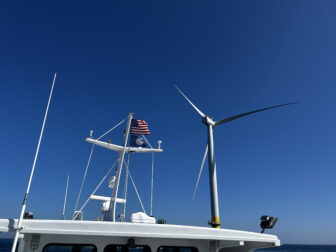This past Saturday, CCANers in Maryland and Virginia held “climate dots” and posed for photos to connect the dots between local effects of climate change and local sources of greenhouse gas emissions in their backyards.
In Virginia, photos included a former U.S. Navy Captain in front of the USS Wisconsin, highlighting the national security implications of climate change, several Virginia winegrowers on their farms that have suffered from the impacts of extreme weather, and Virginia Beach citizens with the iconic Neptune statue, showing that Neptune might really be underwater by year 2100.
Meanwhile in Maryland, students from St. Mary’s College floated face down in the St. Mary’s River to illustrate the deadly threat of sea-level rise to their future. A wine grower in Garrett County gave tours of his vineyard already highly threatened by the unusually warm weather in recent years. Kayakers on the Eastern Shore demonstrated how sea-level rise is erasing an acre of marsh every day in Dorchester County. And citizens in Montgomery County gathered outside a coal-fired power plant to illustrate how American reliance on dirty fossil fuels is the main source of accelerating climate change in our nation.
See photos of the actions below!
The events were part of the first-ever Climate Impacts Day, a global event sponsored by 350.org and its allies that is designed to “connect the dots” between climate impacts, such as extreme weather events, and the broader climate change crisis. At nearly 1,000 events in more than 100 countries, people highlighted how climate change is affecting their lives here and now.
In 2011, the United States saw 12 weather disasters that each caused one billion dollars or more in damage. Around the world, extreme flooding submerged nearly all of Bangkok, drought continued to ravage the Horn of Africa, and typhoons and hurricanes hit vulnerable communities in places like the Philippines. And March 2012 saw 15,000 new record high temperatures throughout the U.S., including Maryland, D.C., and Virginia.
Thank you to the activists across the region who helped us to show how climate change is already impacting our lives!





